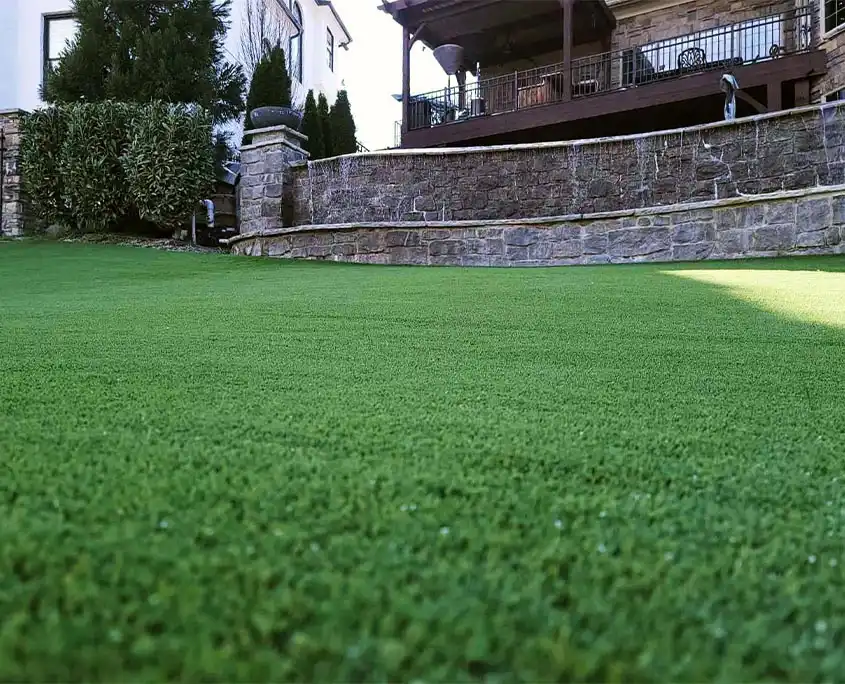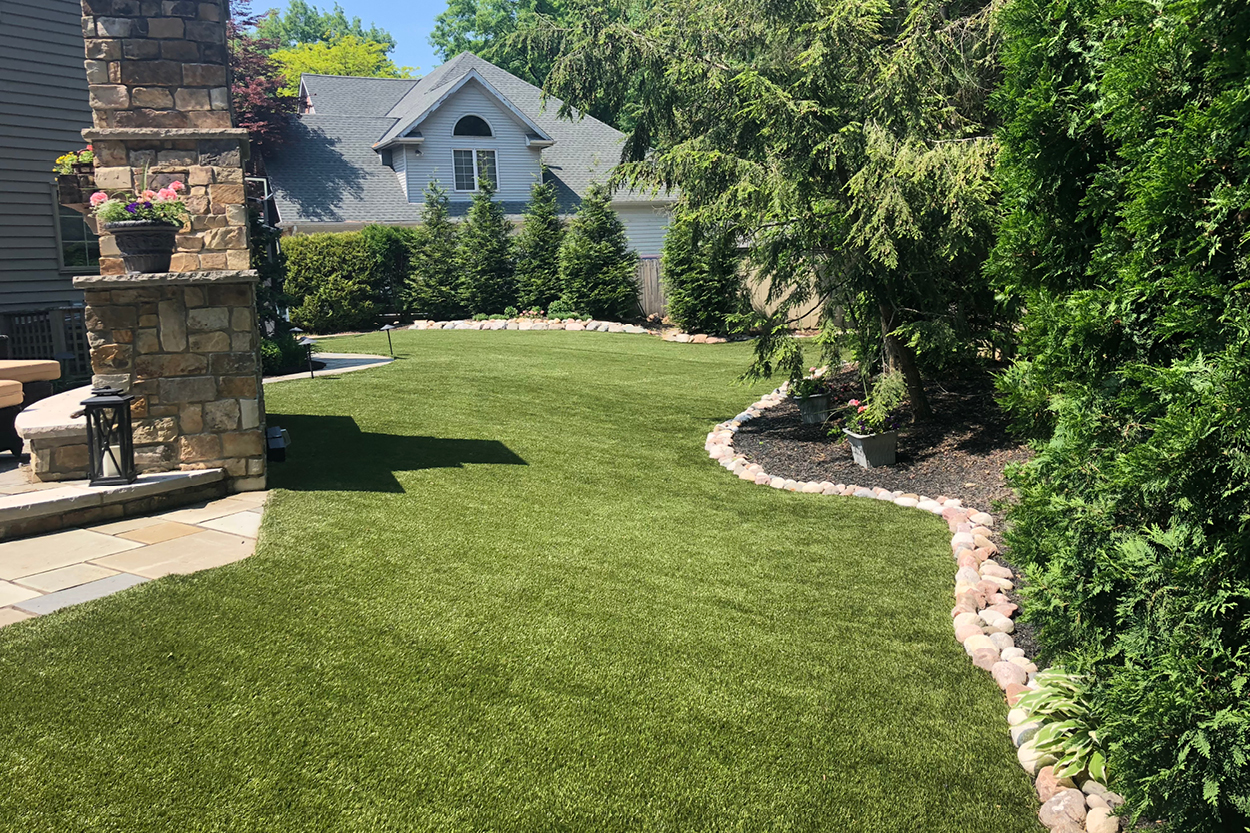Durable Arizona Artificial Turf for Home and Business Applications
Durable Arizona Artificial Turf for Home and Business Applications
Blog Article
Look Into the Environmental Conveniences of Opting for Synthetic Grass Solutions
The adoption of man-made turf options offers a compelling opportunity to resolve pressing environmental challenges. By substantially lowering water usage and reducing the application of unsafe chemicals, these options not just promote lasting landscaping but likewise shield regional environments.
Water Preservation Conveniences
One of one of the most significant advantages of artificial grass is its ability to preserve water. Conventional lawn yards need considerable irrigation, particularly in locations susceptible to drought or water limitations. In comparison, artificial grass does not require watering, dramatically reducing the general need for water resources. This attribute is especially advantageous in arid areas where water deficiency is a pressing concern.
By getting rid of the need for regular watering, synthetic grass adds to lasting landscape techniques and aids reduce the environmental influence of excessive water usage. The conservation of water extends to the decrease of drainage, which can lead to soil erosion and waterway pollution.
Furthermore, the installation of synthetic lawn allows house owners and municipalities to designate water sources much more efficiently, concentrating on vital uses such as alcohol consumption water and farming. The shift towards synthetic grass not only promotes accountable water usage but likewise straightens with broader ecological goals intended at maintaining natural deposits.
As areas increasingly prioritize sustainability, the water preservation benefits of synthetic grass present an engaging situation for its adoption in residential and business landscape design jobs.
Reduced Chemical Use
The shift to synthetic grass dramatically reduces the reliance on chemical treatments generally made use of in natural turf maintenance. Conventional turf management typically entails the application of fertilizers, herbicides, and pesticides to promote growth and control bugs. These chemicals can pose risks to human health, neighborhood wildlife, and the environment, adding to soil and water contamination.
In contrast, synthetic lawn removes the demand for these hazardous compounds. When mounted, it needs very little maintenance, mostly including regular cleansing and seldom infill replenishment. This reduction in chemical usage not just benefits the prompt environment however additionally adds to broader eco-friendly security. By reducing the release of synthetic substances into the community, synthetic grass promotes healthier soil and water supply.
Furthermore, the lack of chemical overflow connected with fabricated turf installments assists secure local rivers from air pollution, sustaining water life and keeping biodiversity. Arizona artificial turf. As communities increasingly focus on lasting practices, choosing artificial grass presents a viable solution that aligns with ecological conservation goals. Via this shift, homeowner can delight in lavish eco-friendly areas without jeopardizing eco-friendly health, leading the way for an extra sustainable future
Reduced Carbon Impact

In addition, the installation of fabricated turf can lead to substantial water conservation. Natural lawns call for significant amounts of water for watering, which not just includes in the carbon impact related to water extraction and therapy however additionally stress local water sources. On the other hand, synthetic grass needs minimal upkeep, needing no watering, thereby dramatically decreasing water use and its connected energy prices.
Additionally, the longevity of fabricated lawn contributes to its lower carbon effect. With a lifespan of up to 15 years or more, the demand for constant substitutes is diminished, causing less waste and lower power consumption in manufacturing and taking care of traditional grass choices. In general, artificial lawn offers a lasting alternative for eco conscious click this site landscaping.
Environment Conservation
Environment preservation is an essential factor to consider in the debate over landscape design choices, especially when comparing synthetic grass to all-natural turf. Natural turf lawns frequently require considerable maintenance, including using chemicals, herbicides, and plant foods, which can adversely affect local ecological communities. These chemicals can leach into the dirt and rivers, harming native flora and fauna and disrupting local environments.
Synthetic turf removes the demand for unsafe chemicals, thereby protecting close-by wild animals and keeping the stability of bordering communities. The installment of man-made turf can lead to the conversion of former grass locations into even more biodiverse landscapes, such as pollinator gardens or native plant areas, which can sustain regional wildlife.
Eventually, the shift to synthetic grass not only preserves water and decreases maintenance efforts but also cultivates a more unified partnership between human activities and the natural surroundings, promoting habitat conservation in the procedure.
Long-Term Sustainability
Long-lasting sustainability is a critical aspect in examining the benefits of synthetic grass over standard yard lawns. One of the most substantial benefits of synthetic grass is its toughness; it can last up to 15-20 years with minimal upkeep, whereas all-natural grass calls for regular reseeding and replacement. This durability minimizes the requirement for continuous resources, such as water, plant foods, and chemicals, which are necessary for preserving a healthy yard yard.
Furthermore, synthetic grass contributes to a decrease in carbon discharges connected with lawn care devices. Conventional yards commonly require gas-powered mowers, leaners, and blowers, every one of which contribute to air pollution. Artificial turf companies phoenix. In contrast, synthetic turf gets rid of the demand for such devices, advertising a cleaner setting
Furthermore, the production of man-made grass progressively makes use of recycled products, boosting its sustainability account. As manufacturers embrace environment-friendly methods, the environmental impact of man-made turf remains to diminish.

Conclusion
The adoption of artificial grass services offers substantial environmental advantages, consisting of significant water preservation, lowered reliance on unsafe chemicals, and a lower carbon footprint. Additionally, artificial lawn aids in preserving all-natural environments by reducing land disruption and promoting long-lasting sustainability with making use of sturdy products. Collectively, these elements highlight the possibility of artificial grass to contribute positively to environmental wellness and provide a viable option to traditional landscaping practices in a progressively resource-conscious world.
In comparison, synthetic grass does not need watering, significantly minimizing the total demand for water sources. By reducing the launch of artificial substances right into the ecosystem, artificial grass advertises much healthier dirt and water systems.
Additionally, the installation of artificial lawn can result in considerable water conservation. In comparison, man-made grass needs very little maintenance, calling for no watering, thus dramatically decreasing water use and its connected energy prices.

Report this page